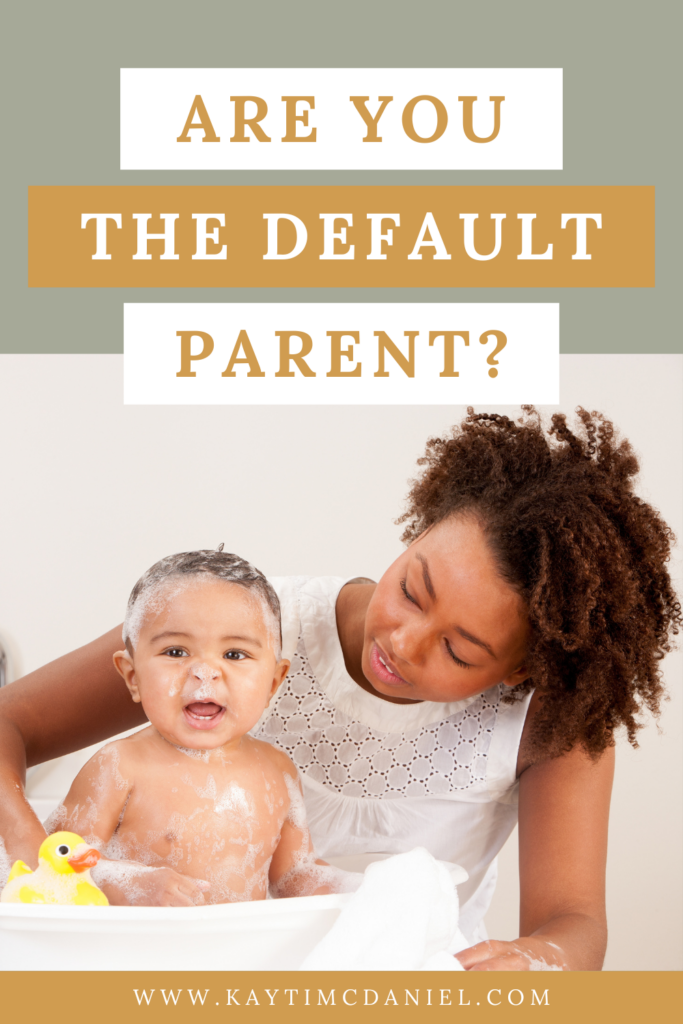
What is the “default parent”?
The default parent is the parent who is expected and assumed to be in charge. This is not a role they chose, it’s one they were assigned. This question of choice is at the heart of the default parent conversation. If you take the lead at home because you truly want to and you and your partner have agreed this arrangement is best for you and your family – awesome. But, it can be helpful to recognize if you taking the lead at home happened gradually over time without much thought about why one parent – specifically YOU – would take that lead. In this post, I share 5 signs that you might be the default parent.
Baked into discussions about the “default parent” is an assumption that there is a co-parent on the scene. Single parents – please know that, while I’m talking to partnered parents here, I see you. You do so much, and you deserve so much support.
Here are 5 signs you’re the default parent:
1. You’re carrying the majority of your family’s mental load.
Since becoming a parent comes with a whole bunch of responsibilities, it also comes with a whole bunch of mental load. Every one of your baby’s needs adds to your family’s mental load. This includes stuff like their nutrition, sleep, clothing, comfort, and medical care (to name just a few). Managing this mental load requires very important “thinking work” – anticipating needs, making plans to meet them, and following through to make sure they’re actually met. If you’ve been left carrying the majority of your family’s mental load without explicitly and enthusiastically consenting to do so, you’re likely the default parent.
2. Your partner doesn’t know how to do basic and routine childcare tasks.
Up front, there may be an honest and reasonable explanation for why your partner doesn’t yet know how to do any given childcare task. For example, maybe one parent went back to work soon after the baby was born and the other parent has been home with the baby logging more hours learning how to do the thing. This is an all-too-common reality for families in our country, where new parents (especially new dads) don’t have access to paid parental leave. Unfortunately it can – and often does – create a longer-term dynamic where one person becomes the default parent. In straight couples, this is usually mom (even if and when she’s working outside the home too). If you’re the default parent, you may have become the household expert on all things baby — not necessarily because you chose to or wanted to, but because you were expected to.
3. You’re doing a lot more than your partner even when they’re home.
Whether one or both of you work outside of the home, it’s likely that one parent is with the baby for more hours per week than the other. Of course, this parent will do more caregiving during those hours. For example, if you are a stay at home parent and your partner works from 9 to 5, you will naturally be doing more caregiving than your partner between the hours of 9 to 5 (plus any commute time). I want you to think about your own situation – how is caregiving shared (or not shared) when you’re both at home? Have you discussed and decided how you’ll work as a team to take care of the baby and each other? Can you trust your partner to show up as a fully capable and competent co-parent? Are your needs for rest and self-care just as prioritized as theirs? If not, this is another sign that you may be the default parent.
4. You feel guilty asking your partner for “help.”
Asking your partner for “help” with any given task implies that you are ultimately responsible for that task. It is generally expected and assumed that you will handle it. When and if they do, they’re doing you a favor. If you’ve already divvied up responsibilities in a way that feels good to both of you, guilt may signal your sensitivity to the potential impact it may have on your partner to momentarily take on more than their fair share. If you’re the default parent, you may find yourself stuck in a dynamic where your partner doesn’t contribute unless they’re specifically asked to. In this case, your guilt about asking for “help” may actually be a signal that you’ve internalized the message that it’s all on you.
5. You feel resentful about your current division of labor.
Depending on the day, being the default parent can leave you feeling resentful, annoyed, frustrated, angry, or even RAGEY. These are uncomfy feelings. AND, they can give you a lot of good data about your unmet needs or where your family systems may be out of alignment with your values. They’re likely to show up when you perceive an injustice or when a boundary is being crossed – like having to carry more than your fair share on an ongoing basis without your consent.
Do you relate?
Do you relate to any of these signs that you’re the default parent? If so, the first thing I want you to know is that you’re not alone. This is a dynamic that impacts almost every new parent I see in my therapy practice — whether they are the default parent or they are realizing for the first time that their partner is. This awareness and understanding can remind you of your choices. Whether you choose to continue taking the lead or choose to renegotiate roles and responsibilities with your partner, you can do so with a sense of agency, enthusiastic consent, and clarity about what matters most to you and your family.